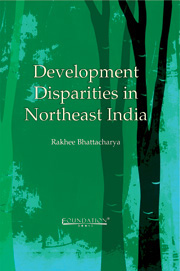Book contents
- Frontmatter
- Contents
- Preface
- List of Figures
- List of Tables
- 1 Challenges of Disparity in the Northeast
- 2 Dimensions of Disparity in the Northeast
- 3 Facets of Government Finance in the Northeast
- 4 Economy of Insurgency in the Northeast
- 5 Energy Interplay in the Northeast
- 6 Development Initiatives in the Northeast
- Index
2 - Dimensions of Disparity in the Northeast
Published online by Cambridge University Press: 05 June 2012
- Frontmatter
- Contents
- Preface
- List of Figures
- List of Tables
- 1 Challenges of Disparity in the Northeast
- 2 Dimensions of Disparity in the Northeast
- 3 Facets of Government Finance in the Northeast
- 4 Economy of Insurgency in the Northeast
- 5 Energy Interplay in the Northeast
- 6 Development Initiatives in the Northeast
- Index
Summary
Inquiry into Inequality: Where is Northeast India?
As seen in the first chapter, nature's hostility and the rulers' apathy in the geopolitical discourse of the Northeast's history, has made contemporary Northeast an isolated problem arena. In its journey of transition and development, the experiments in the Northeast have consistently failed. This has been the case in the political, social, ethnic, economic, infrastructural and strategic domains. Most of these perspectives have identified development as the key issue that needs to be addressed. However, opinions vary as to how the dream of development in Northeast India is to be realized. Those areas of development that need the utmost attention have to be identified and prioritized. While locating individual foci remains an important technique in dealing with multiple problems, a more integrated understanding of development might be required. This integrationist perspective prioritizes a panoptic analytic vision of the various problems instead of any single or delinked emphasis on either economic underdevelopment, the insurgency threat or the ethnicity issue. This involves looking at the Northeast in a new way, not simply as a single problem unit but as a sensitive, internally differentiated terrain, where intra-regional specificities need to be given attention. The methodological thrust should be to achieve integration through a new assessment of the unique political, economic and social settings of the Northeast as a region, and also to understand the intricacies of intra-regional variations of problems, their manifestations, causes and consequences.
- Type
- Chapter
- Information
- Development Disparities in Northeast India , pp. 24 - 55Publisher: Foundation BooksPrint publication year: 2011



